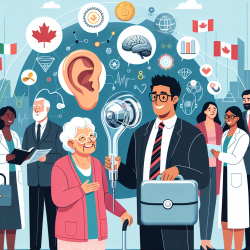Introduction
The COVID-19 pandemic has been a catalyst for significant changes in the delivery of healthcare services, particularly in mental health. The recent study, "Associations between accessibility to health care service, social support, and Korean Americans’ mental health status amid the COVID-19 pandemic," highlights crucial insights into how accessibility and social support impact mental health among Korean Americans. This blog will explore how practitioners can leverage these findings to improve outcomes for their clients.
Key Findings from the Study
The study conducted by Min, Choi, and Park (2021) revealed several important findings:
- Language Barriers: Korean Americans experiencing language barriers were less likely to report good mental health. This emphasizes the need for healthcare services to include language support to improve accessibility.
- Social Support: High levels of perceived social support from family and friends were positively associated with better mental health outcomes.
- Telehealth Utilization: The study suggests that telehealth can be a valuable tool in providing mental health services, especially during times of restricted physical access.
Implementing Research Outcomes
Practitioners can take actionable steps to incorporate these findings into their practice:
- Enhance Language Support: Employ translators or bilingual staff in healthcare settings to bridge communication gaps. This can significantly improve access to mental health services for non-English speaking clients.
- Strengthen Social Support Networks: Encourage clients to maintain regular contact with family and friends. Facilitate group therapy sessions or community support groups to foster a sense of belonging and emotional support.
- Leverage Telehealth: Train staff to effectively use telehealth platforms. This can be particularly beneficial for clients who face mobility issues or live in remote areas.
Encouraging Further Research
While this study provides valuable insights, it also highlights areas for further research. Practitioners are encouraged to explore:
- The long-term impact of language barriers on mental health outcomes.
- The effectiveness of telehealth in different demographic groups.
- Innovative ways to strengthen social support systems in diverse communities.
Conclusion
As practitioners, it is crucial to stay informed and adapt to the evolving landscape of healthcare. By implementing data-driven strategies and fostering inclusive environments, we can improve mental health outcomes for all clients. For those interested in delving deeper into this research, I highly recommend reading the original study. To read the original research paper, please follow this link: Associations between accessibility to health care service, social support, and Korean Americans’ mental health status amid the COVID-19 pandemic.










